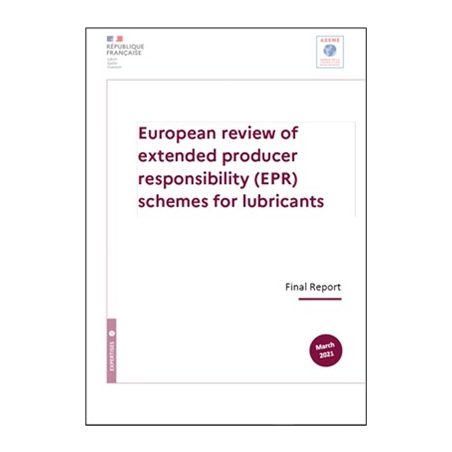Bilan européen des filières à responsabilité élargie des producteurs (REP) pour les lubrifiants
Etude/Recherche
Mis en ligne le : 22/03/2021

This study highlights the different mechanisms chosen by the European EPR lubricant schemes studied:
After studying 8 EPR schemes, 5 countries were selected for in-depth analysis: Belgium, Greece, Italy, Portugal and Spain. The contextual factors specific to each country were also highlighted. All relevant aspects concerning these sectors were analysed: history and context of implementation, scope of regulations tackling EPR and waste oil management, scope lubricants covered by the EPR scheme, key figures, governance and management of the PRO, relationship of the PRO with stakeholders and selection of operators, relationship of stakeholders with each other, role of public authorities, controls and sanctions, scale of EPR fees, downstream financial support scale, eco-design, other actions of the PRO. This assessment provide all stakeholders with information on the way in which EPR schemes for lubricants have been set up in these countries and to provide them with the elements needed to prepare the implementation of EPR for lubricants in France.
This study highlights the different mechanisms chosen by the European EPR lubricant schemes studied:
After studying 8 EPR schemes, 5 countries were selected for in-depth analysis: Belgium, Greece, Italy, Portugal and Spain. The contextual factors specific to each country were also highlighted. All relevant aspects concerning these sectors were analysed: history and context of implementation, scope of regulations tackling EPR and waste oil management, scope lubricants covered by the EPR scheme, key figures, governance and management of the PRO, relationship of the PRO with stakeholders and selection of operators, relationship of stakeholders with each other, role of public authorities, controls and sanctions, scale of EPR fees, downstream financial support scale, eco-design, other actions of the PRO. This assessment provide all stakeholders with information on the way in which EPR schemes for lubricants have been set up in these countries and to provide them with the elements needed to prepare the implementation of EPR for lubricants in France.
Documents associés
Etude/Recherche
Mis en ligne le : 22/03/2021
European review of extended producer responsibility (EPR) schemes for lubricants